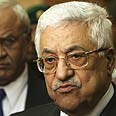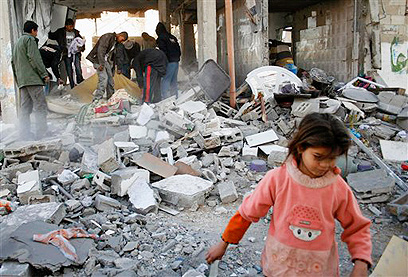
US sees Gaza rebuilding as opportunity for Abbas
American, Western officials aim to ensure credit for reconstruction of Strip following Israeli military operation accrues to Palestinian Authority, not to Iranian-backed Hamas Islamists
US and Western officials said details have yet to be worked out and depended on the extent to which Israel's military offensive, which has killed more than 900 Palestinians, weakens Hamas' hold on power.
The aim would be to ensure that credit for reconstruction accrues to President Mahmoud Abbas' Palestinian Authority, and not to the Iranian-backed Islamists who won a 2006 Palestinian election and seized control of Gaza 18 months later.
A senior European diplomat involved in the discussions dismissed the idea "as a recipe for failure from the start".
Any major reconstruction program is likely to face major hurdles, from Palestinian infighting and corruption to Israeli obstructionism, that could further undermine the credibility of "moderates" like Abbas, who advocates a peace deal with Israel, aid officials said.
"Whoever rebuilds Gaza will be the real winner," said one Western diplomat, describing Israel's war in Lebanon in 2006 as a sobering lesson for Washington about the political dangers of not moving quickly enough on reconstruction.
At the end of that conflict, the guerrilla group Hizbullah, with Iranian financial support, pumped money into reconstruction, undercutting the Western-backed government in Beirut. Hizbullah emerged "stronger than ever", the Western diplomat said.
Nobody knows how much money Gaza will need, but aid officials said the sums would be vast given the destruction.
Since the start of its offensive on December 27, Israel has bombed more than 2,000 targets in Gaza, an Israeli security source said. Few bridges or government buildings are still standing. Even partial reconstruction will take years.
Western donors who financed most of this infrastructure in the first place have grown weary of seeing it destroyed by the Israelis and then being asked to fund the rebuilding.
"We are pissed off," said a senior European diplomat based in the region. "We may end up paying again."
The diplomat, who struggled for months to convince Israel to let pipes into Gaza for a Western-backed sewage project, said a wider reconstruction effort may be little more than "wishful thinking" given the hurdles posed by Hamas and the Israeli army.
Mushir al-Masri, a senior Hamas official in the Gaza Strip, insisted that his group remained the legitimate authority and would spearhead reconstruction after the fighting ends.
Even if Western aid for Gaza flows through the Palestinian Authority, diplomats said it would make little impact if Israel kept curbs on imports of steel, cement and cash - supplies, it says, that Hamas could use to build rockets and tunnels.
Hamas chased out pro-Abbas officials when it took over the Gaza Strip in June 2007 and has run its own government since.
"Let's be realistic," the senior EU diplomat said. "If the Palestinian Authority is to be in charge, it has to be on the ground, have institutions. At the moment there is none of that."
Donor fatigue
EU officials said preparations were already under way for a donor conference. But diplomats questioned whether donors facing a global recession would add much to the $7.7 billion they pledged in 2007 to back US-led peace talks that went nowhere.
A Bush administration official said the United States was weighing how Gaza reconstruction could be used to bolster Abbas. "We certainly don't want Hamas to benefit by the reconstruction program and we certainly don't want any of this money to go to Hamas or through Hamas," the official said.
"On the positive side, we also want the legitimate Palestinian government, the PA, to get the credit for this and also to be able to reassert a presence in Gaza. Obviously Hamas will oppose this, so it's going to be a difficult issue."

Ruins in Gaza (Photo: AP)
Abbas' prime minister, Salam Fayyad, is approaching donors, making housing the homeless his first priority and drawing up plans to repair all ruined or damaged buildings in Gaza.
US officials said a vital question was how Palestinians will view the Israeli offensive after it is over.
"It is very plausible that the people of Gaza will, in substantial numbers, blame Hamas for getting into this conflict," one official said of Hamas' decision to abandon a Cairo-brokered truce last month and fire more rockets at Israel.
If Israel succeeded in destroying the smuggling tunnels under Gaza's border with Egypt, Hamas will have a hard time bringing in enough cash and building supplies to challenge Abbas, even if Iran is willing to send it more money.
But Hamas' woes may not translate into gains for Abbas, whom the Islamists no longer recognize as president. Abbas' initial response to the crisis - blaming Hamas for the Israeli onslaught - upset many Gazans living under fire.
As in the past, most foreign donors will insist that their money is not diverted to Hamas, leaving the group with a choice of accepting the conditions or being blamed for losing the aid.
"Hamas is going to be hard pressed to turn the aid away when the need is so great," a US official said.
Asked if Israel would cooperate by letting enough steel, cement and other goods into Gaza to strengthen Abbas' position, an Israeli official said only: "We haven't gotten there yet."










